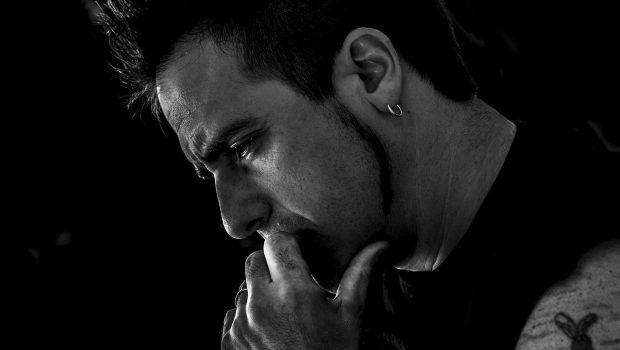The Name of Things
Nayla Chehade
Translated by Lisa Huempfner
It was no secret to anyone that the marriage was going bad, real bad. I mean, that there was nothing left, no pieces to be glued together, shattered forever. But that things would end this way, no one could ever have imagined, not even me, who knew more than most what it was really like deep down. And it’s not that we had grown accustomed to the quarrels between the two that got ever worse without reprieve. Now this is it, we would say; it’s gone as far as it can. There’s nothing left, it can’t go on. But no. There was always one last time, and that is what confused us, because when we least expected it, after one of these blowups, there they were, “my love” here and “my precious little doll” there, and “stop at the corner, Arnulfo, so I can buy that bouquet of yellow roses that the señora likes so much,” and “listen, Arnulfo, let’s go by La Ibérica and pick up some of those chorizos that the señor loves,” and then everyone seemed to forget the inferno of the previous days, that cruel hatred that the señora hurled with each word and that battered the Nazarene demeanor with which the señor bore this humiliation and scorn. And for a few days we would breathe freely, praying that this deceptive peace that was like a tranquil river full of treacherous whirlpools, would last them if only for a short while and that the contentment with which they awoke would not turn into the fetid venom that would splatter us all and poison our every hour.
I’m not certain at what moment they entered this dark, bottomless hole that swallowed the entire house with its people and its possessions nor what to call or how to understand what we had to live through at that time. Because at first, anyone could have sworn that there was something of a solid, well-rooted trunk there, capable of withstanding steadfastly the worst blows and tremors. The truth is that it was pleasing to see them together because of how well they looked beside each other. With that smooth, clear complexion and that way of moving about, almost like dancing. And when they’d hold each other’s hands or when he’d caress her face as though he were touching one of the fine porcelains that they had in the living room and that no one was allowed to touch for fear they would break them, or when she would take to fixing his hair, running her long fingers, red-nailed as always, through the furrows of his head, one couldn’t stop looking at them, nor thinking that people like them could be seen beyond those magazines that the señora read, but rather, it was a matter of pure luck, like a lottery, that very few win at birth and that most of us have lost right from the start. One would have to see her, with that long, black mane, so shiny, and always so well-styled by Amparito’s hands, who knew better than anyone about curling and straightening and all the other tricks that women do with their hair, and with those enormous eyes, just like her mother’s but enveloped by green and yellow tones that would change with the light of the sun. If ever there was a definition for beauty, she was it, and with such charm that it would make you forget the fits and tantrums that she threw as a little girl, the ones that I so often had to contend with, and her capricious whims that had us all running ‘til the end, that no, I can’t accept these shrimp, go back to the market, Arnulfo, and tell the negrita that they’re not like the ones I usually get, pink and fresh, the way I like them, that these don’t even smell like the sea like they should and look at the size, so she can’t fool me, there’s a reason why the ceviche that’s eaten in this house is the best, and there I would go without saying a word and I’d exchange the shrimp for some just like them that she would find divine, and listen, Arnulfo, how can he think that I’m going to use this tenderloin for dinner, with all of the guests that I’m having today, look at the color and this slimy stuff on top of it, do me the favor of going to Mr. Alejo and telling him that there are tons of butcher shops in the city and if he doesn’t treat me as I deserve, I’m not going to buy anything more from him, and there I would go, and I’d exchange the tenderloin for another that wasn’t any different from the first but that would seem perfect to her for cooking with white wine and pepper as her mother had taught her and then I’d see her breathing much easier, mistress of her kitchen and of the help who followed her orders without a word, content to see the señora content, happy to see her happy, asking them to mince here, to mash there, to sauté carefully in the medium-sized pan, to boil without burning themselves in the big kettle, thanking me for everything with a gentleness in her words and an affection in her voice that I felt was sincere, that look, Arnulfo, I haven’t seen you eat anything all morning, sit down and relax and drink your coffee and eat an arepa with that delicious white cheese we bought yesterday, you’re so wonderful Arnulfo, I don’t know what I would do without you, thank God you came to work here with us years ago and were able to escape alive from that leaf cooker out there in the jungle that you were tangled up in when they shot that mysterious boss of yours and everyone took off, tell me if it wasn’t pure luck or a miracle, surely they would have killed you, too, and no one would have cared, as happens every day and without anyone here even realizing it, don’t you think?, because things haven’t changed very much, and listen, Arnulfo, about Estercita’s First Communion, don’t worry, we’ll have Doña Milagros make the dress, with pearls around the waist and all, and a big band of lace around the skirt, and of course, we’ll get the shoes downtown, white patent-leather with a strap across the top, as it should be, and so what if the little girl doesn’t have a momma and a daddy, she has the best grandpa in the world, and I felt important and loved, and with the desire to keep pleasing her in whatever she asked for, even if it meant going to the end of the Earth in order to see her satisfied and grateful. And the same was true for the señor, of course, because even though he was in a position to give orders, he never asked for anything. You had to guess what he was thinking and be ready for whatever he needed. And that had to have been one of the things that made the señora explode and bothered her so much, I think, because I’m sure she would have liked someone tough at her side, I don’t know, someone who wished to have more of what they already had too much of, to go through life and the world showing off his good fortune with much noise and swagger, like those who visited the house, but to tell the truth, he wasn’t one of them. We all knew it. Anyone could see how he suffered with the parties that the señora would so often get the urge to throw. She would make us run like crazy for weeks on end so that everything would be just as she had imagined, just as she had dreamed, with the flower arrangements throughout the house, astromelias in the corners, platanillos by the pool, a lot of red, a lot of color everywhere and white calla lilies on the tables, very elegant, don’t you think Arnulfo? And with her starched table cloths that I had picked up from Lavaseco and inspected with care to be certain they did not have any wrinkles, nor stains left from the previous party, and her dessert table and her brilliant trays overflowing with all sorts of meats, filled with fresh shellfish from the negrita’s market stand, heaped with rices bathed in butter and adorned with chopped parsley, so crisp and bright, that I myself had bought from the herb man, everything just as she had seen in one of her magazines, better than the last banquet at the Club, because that’s how it always had to be with the señora, the best of the best. Even her husband, of course. But no. For him, all of this was torture and even though he didn’t complain, it was easy to see that all this fuss wasn’t his thing, and if he swallowed it whole, it was only so that he could see his queen happy, to see her face of excitement when everyone told her that they had never been to a party like this, that they had never eaten such a delicious meal, that where did she get such flowers, that who did she buy the cheese from, that what was her secret to looking more lovely each day. To set out on the Carretera al Mar and take his little boy to the country house all weekend and do his own cookouts and inspect the orange and guava trees to make sure they didn’t have blight or to go down to the little mountain spring and come out of the water yelling, dying with laughter, when the boy, blue with cold, would run to his father’s arms in search of warmth and things like that, it was what he loved and what he so seldom could do, because even before he could decide, the señora would have him tied up with something else. That’s the way it was. And he would accept it without protest, as if in the end, the only thing that really mattered was to make her life happy, to see her laugh tossing her hair around when the guests would praise her and the wine that she was drinking would bring color to her cheeks and make her float about all excited among the people, as though she had wings and could be in every corner of the house at the same time. From a distance, she would send me signals so that I would ensure that the waiters were serving people well without wasting the liquor, so that over in the kitchen everything was in order and that at the tables the guests were content with their plates full of food. I would answer her with a nod of the head, calming her with gestures that she already knew, assuring her that everything was going fine, letting her know with my hands that she should continue enjoying her party without worrying, reminding her that all of the years I had worked for her mother had taught me very well what I needed to do. And I wouldn’t leave until everyone had gone. Afterwards, she would always take off those shoes of hers with the enormous heels on which she had been mounted all night and she would throw them aside and thank me for everything, what a wonderful party, don’t you think Arnulfo, what a beautiful evening, right? The next time, let’s not bring in mariachis, and let’s hire a trio. They never go out of style. But go rest now, because tomorrow the cleaning girls will finish picking up everything, without realizing that it already was tomorrow, that dawn was about to break, and then she would take her husband by the hand and they’d go up the stairs, arms around each other, glued together as though they were one, and there I would stop because I didn’t want to imagine things, I didn’t want to think of him slowly taking off her clothes and of her letting herself fall breathless on the bed like a rag doll, soft and pleasing in that huge bed of theirs, full of pillows and cushions, that’s where I would stop, when he would also thank me for all of my help and you could see his haste to go up, to collect his prize earned at the limit of his patience and to receive in the end what was due him after having turned red to the ears so many times without exploding, having to think first of what came first and she, of course, was always what came first, go home Arnulfo and don’t forget to turn off all the lights and to take whatever you want, you saw how much food was left over, you know how the señora goes overboard, she never thinks there will be enough and in the end, there’s too much of everything, almost enough for another party just like it. And finally, I would go and leave them up there, in that enormous house, quiet after so much noise and so much music, even larger still without the people and its mistress around. That’s how it was on those days in which everything was in its place, until the world would start falling once again, and it would crush us all, but of course, the señor more. Much more. Then she would stop giving orders in the kitchen and worrying about the true sea smell of her shrimp and the freshness of her meats, whether they did a good job of cleaning the dust that collected on the edges of the pictures or whether they picked up every last dry leaf in the garden as she would demand. And the house continued on its own course, the one she had set as the señora that she was, so that we would do as we had to do so that life would seem the same, the crystal blue pool reflecting the sun and the open cloudless sky, the table set in white the way she liked it and the green of the plants even greener, but all with a deceptive calm, hanging on to a thread that was about to break. And it would break. She would have her mother and the help take care of the boy and she wouldn’t mention parties or banquets again and the only thing we’d see of her would be that thick rage that she would sling at the señor with her every word and that would make him break out in red blotches on that white face of his. His hands would shake as though he were sick, but he wouldn’t say a thing, not even when she would pound his pride with things that we were ashamed to hear and that we wouldn’t even repeat amongst ourselves afterwards, so that it wouldn’t make it so hard to look him in the eyes and pretend that we didn’t know anything, that no one had heard her screaming when she would say that he was worthless, in business and even more so in bed, that seeing him eat and speak and feeling him breathe just disgusted her, that she would be better dead than to continue by his side. But the one who died at the wrong time wasn’t her. That’s the way life is. On the way to the factory with the señor, I knew we couldn’t listen to music, not even the vallenatos that he liked so much or Felipe Pirela’s boleros that he knew by heart and that he would hum to with feeling back in the days when his soul was not weighing on him, and much less could we tune in to the news or talk about what we always talked about, the traffic that would punish us every morning, it’s not this way in other places, Arnulfo, believe me, there are a lot of cities where people stay in their lane and pay attention to traffic signals and you don’t hear all of this shouting and honking that drives us crazy around here, nor could we complain about the potholes in the streets that ruined shock absorbers and tires and that no mayor of any party was ever going to fix, because in those moments, everything was just too much and it was as if the words had all been used up or were worthless. I would sneak a look at him in the rearview mirror so that he wouldn’t feel my eyes upon him or realize that I could see the sweat that was pouring down his forehead in a car so cold it would have made the señora shiver and the veins about to explode in his neck, enclosed in a tie that seemed to be choking him. But it isn’t easy to see the sorrow when it is dressed in so much anger, nor to tease out the pain when it comes wrapped in rage. That’s why I know he wasn’t the only one who was suffering. If not, who would have been able to deny that those tears that would fill the face of the señora for days and that would leave dark circles all around her eyes, and that low noise without words, that wouldn’t stop, and that came from deep down in her chest, as though from someone who’s being skinned alive and doesn’t have the strength to yell, weren’t real, when she saw the broken neck of her husband, yellow like the wax they used to polish the floors of the house, and the mouth hanging as though of someone who has been asleep for hours or who has run up a hill and is having trouble breathing, and she surely realized that this was it. That she had to slam on the brakes and there was no way of going back because where he was not even the worst of the insults could ever reach him again nor the sweetest of her frantic words of love that we could clearly hear her say when she would wake up crazy for him. So real was this sobbing, I’d say, as the repugnance that she would so frequently spit at him without mercy right in front of us during her spells of blind rage, so true her sorrow, that I don’t know if she was ever able to heal from so much pain or went back to feeling the same lust for life as she did during the grand days when she would arrange such revelries and turn the kitchen upside down with her urgent orders and last-minute counter orders before each banquet, if she was able to climb up another time on her heels and paint her nails bright red and burst out laughing showing those gleaming white and perfectly even teeth that seemed too good to be true or to show off the charms of her body and let her hair down the same as before, when Amparito would style it and she would live convinced, like a little girl, that all of the flattering comments in the world were made thinking only of her. For me, I don’t think so. That all this went hurtling to the bottom of the cliff with her husband the afternoon that they called her to inform her that they had found the body at the bottom of a ravine near kilometer 23 of the Carretera al Mar and they told her that it wasn’t known if the pavement was more slippery than usual because it had rained all morning, if it was the fault of the fog that seemed thicker than ever because the sun hadn’t come out the entire day to lift it, or if the truck of a drunk driver going at full speed that they had stopped further up ahead took a curve too wide and had sent him straight over the edge. The fact is that he was dead. And knowing how it happened wasn’t going to change anything. Just make the lashes of this ugly, twisted thing that she must have been feeling, similar to what they call remorse, burn even more, that, yes, I would say. She didn’t let them slice him open and poke around the secret pathways of his organs in order to know the ultimate truth, because, of course, the señora had her important friends all over the place. For me, I’m sure that what she wanted was not to hear from the mouths of others what she surely already knew, and which deep down, must have been the same thing that I was thinking but never dared to say. Why hurt her more, if she had suffered enough already.
He came to rest in the Jardines de Recuerdo, on a little hill where the air feels fresh and the mountains can be seen behind, and at nightfall, from a distance, Christ the Redeemer, as well, lit in blue and with his arms wide open. They buried him alone and at ground level because even though they tried they couldn’t put him in with the other dead of the family in the old cemetery, in their so elegant mausoleum that resembled a little marble house. There, they won’t let anyone be buried anymore, for some time now. Just as well. The few times that I have gone to visit him, the grass is always green and you can see thick trees that give good shade and some little cascades that make a peaceful sound of running water throughout the day, and while some graves have more flowers on them, his has a lush daisy plant and a very clean tombstone, with the name really clear, unlike the others that have been worn away over time by the sun and rain. It’s probably the doings of the señora, that from wherever she may be pays a nice fee so they will take good care of her deceased one. It costs a lot to die in this country, although even more to keep one’s self alive, of course. But the last one, the Devil pays, as the saying goes. What’s hard is the time that we spend up here; afterwards, who cares whether the birds sing above your bare bones or if we get mistaken for another dead person or we end up in a niche of cement in one of the rows of the Central Cemetery, so sad and so long, where I have my Teodora. It’s all the same.
I never heard anything more about the señora. The day that I handed over to her my copy of the car keys was the last time I saw her. She hugged me and she felt like skin and bones, at the point of breaking into pieces on the tenth day of the death of her husband, without the sweet smell of that perfume that we all knew and with which it seemed she would drench herself from head to toe each day. My eyes filled with tears, how couldn’t they? And the truth is, she didn’t talk much, thanks for everything, Arnulfo, she said, as though it was only the end of my work day and I had nothing else to do and I was going to return really early in the morning to help her with her household chores, to run to the market as many times as she wanted and not let her world come to an end and take her and bring her to wherever she needed, completely at her disposal as I had been for so many years. But that time it was forever. She left with her son and even her mother but she didn’t tell anyone for where. They had plenty of places far from this country and that’s where they stayed. By now, surely the little boy is big, and who knows how much he remembers his dad. But I do. When I’m least expecting it, there I see his face before me, not the one of the happy times, and they did exist, but the other one, the one that makes me shudder to remember, the same one that must torment her as well. Or maybe it doesn’t anymore. Perhaps her soul found peace. She had enough youth for it to burst inside her and lighten the weight of so many difficult memories and push her to know and feel new things. I don’t know. For my part, I carry my load the same as everyone else and without complaining keep going on down what’s left of my road, although I can’t deny that still at this age, a hornet’s nest gets stirred up there inside me and a very old sorrow rises up for things that I did or didn’t do. And that is hard. But a lot of people in this country have it worse than me. I got little Ester ahead, with school and everything, and the house, after so much patching up and adding on, I finally paid it off, and put it in her name so that no jerk can mess things up for her. On that front, I feel good. And I still have this cab, which has fed us for years. And for all that, I have to be grateful for the pension that the señora gave me, of course, so big, that it was hard for me to believe. But I also gave to her with open hands and in good faith, without bad will, nor ever thinking of muddying the trust they had in me. And there’s no price for that. She knew it. Now, nothing is urgent like before, and I have more hours than I wish to retrace my memories. I pass through streets and corners of a city that has become increasingly foreign to me and I get tired of going to so many places without getting anywhere, until the moment when without fail, the fresh breeze that comes down from the mountains begins to blow and I know that it’s time for me to go home. I haven’t been the same for a long time now. My hands have become knobby and tremble, and in the dark, the lights of other cars blind me. I, who escaped so many dangers, don’t know anymore how to avoid the anger of others, and I swallow in silence insults and offenses that I never would have put up with before. I sleep very little, and when I get up, a deep chill enters me between my chest and back and I fear what might happen out there. I always say that today will be the last, and as well as I can, I grab hold of the wheel and take to the street.
*XXV Ana María Matute Prize for Narrative, 2013
 Nayla Chehade is the author of A puerta cerrada and a professor at the University of Wisconsin.
Nayla Chehade is the author of A puerta cerrada and a professor at the University of Wisconsin.
Posted: September 29, 2015 at 11:14 pm










